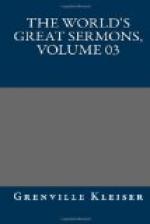as indications of this life were only morbid and overstrained
emotions. As the Lord convinced His disciples
that He had flesh and bones, so we may all convince
ourselves and each other that this is an actual life;
but in that case we must believe that, tho in a hidden
way and not always present to our consciousness, yet
it is always in existence, just as the Lord was still
in existence even at the times when He did not appear
to His disciples; and had neither returned to the grave,
nor as yet ascended to heaven. Only let us not
overlook this difference. In the case of Christ
we do not apprehend it as a natural and necessary
thing that during those forty days He led a life apparently
so interrupted; but each of us must easily understand
how, as the influence of this new life on our outward
ways can only gradually become perceptible, it should
often and for a long time be quite hidden from us,
especially when we are very busy with outward work,
and our attention is taken up with it. But this
is an imperfection from which as time goes on we should
be always becoming more free. Therefore always
go back, my friends, to Him who is the only fountain
of this spiritual life! If, ever and anon, we
can not find it in ourselves, we always find it in
Him, and it is always pouring forth afresh from Him
the Head to us His members. If every moment in
which we do not perceive it is a moment of longing,
as soon as we become conscious of the void, then it
is also a moment in which the Risen One appears to
our spirit, and breathes on us anew with His life-giving
power. And thus drawing only from Him, we shall
attain to having His heavenly gifts becoming in us
more and more an inexhaustible, continually flowing
fountain of spiritual and eternal life. For this
He rose from the dead by the glory of the Father, that
we should be made into the likeness of His resurrection.
That was finished in His return to the Father; our
new life is to become more and more His and the Fathers
return into the depths of our souls; there they desire
to make their abode; and the life of God is to be
ever assuming a more continuous, active and powerful
form in us, that our life in the service of righteousness
may become, and continue even here, according to the
Lord’s promise, an eternal life.
MASON
MESSIAH’S THRONE
BIOGRAPHICAL NOTE
John Mitchell Mason, the eminent divine of the Reformed Presbyterian Church, was born in New York City in 1770. He completed his studies and took his degree at Columbia College and thence proceeded to take a theological course at Edinburgh. Ordained in 1793, he took charge of the Cedar Street Church, New York City, of which his father had been pastor. In 1807 he became editor of the Christian Herald, and in 1821 was made president of Dickinson College, Carlisle, Pennsylvania. He died in 1829.




